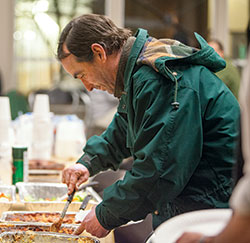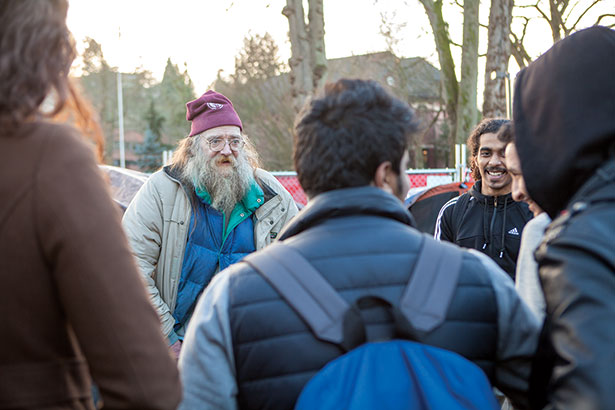
By Clint Kelly (ckelly@spu.edu) | Photos by Luke Rutan
With scarcely a trace of irony, the hand-lettered sign at the center of camp reads: “Home Sweet Homeless.”
“Tent City is like a big family,” says David Yu, who hoped to move into permanent housing before TC3 left Seattle Pacific University this month for its next host site. “Sometimes people don’t get along, but we all look out for one another.”
Trina Guevarra, stroking her puppy, Bentley, nods. Possessed of a tender heart, she would rather stay and help residents get back on their feet. She is especially good with newcomers. “Everyone has problems,” she says. “I will sit down and talk with people about what they need. This is my home. People ask if I’m crazy to think that, but I love this place.”
 Weekly student-prepared meals,
funded by ASSP, provided opportunities
for students and campers
to build friendships over dinner.
Weekly student-prepared meals,
funded by ASSP, provided opportunities
for students and campers
to build friendships over dinner.![]() View more photos
View more photos
This is Yu’s and Guevarra’s second stay at Tent City 3, a self-managed encampment of about 100 people experiencing homelessness. This time, they say, they were scammed out of an apartment by a landlord found on Craigslist and lost their belongings. They were suddenly homeless again.
On December 13, 2014, Tent City 3 returned for a second three-month stay on Seattle Pacific University’s campus. Earlier that week, members of the campus community gathered to pray over the ground.
“Tent City provides our community a unique opportunity to care for and learn from our neighbor,” says SPU President Dan Martin, who assisted with the move-in. And good neighbors they are. Under the auspices of SHARE (Seattle Housing and Resource Effort), TC3 operates by a strict code of conduct. Sobriety is mandatory. Weapons are banned. Violence, verbal abuse, and intimidation are not tolerated.
The tent community that takes in approximately 700 people a year provides its own 24-hour security and maintains quiet hours from 9 p.m. to 8 a.m. A good percentage of its residents either work or are job-hunting, dreaming of the day when they can once again afford to live in permanent housing.
The camp’s leadership zealously guards its reputation as a well-managed alternative to emergency shelter or unsheltered homelessness. Because TC3 has a consistently strong record, it is doubly troubling for its advocates that county and FEMA funding have all but dried up for SHARE, despite its role as one of the most cost-effective shelter providers in the region.
What should be the Christian response to the growing homeless challenge (including 1,300 homeless veterans in Washington state alone)? Who holds the power in meeting the needs of the poor and the homeless? Daily confronted with the reality of Tent City, the Seattle Pacific community grappled with these and other challenging questions raised by the homeless in its midst.
“We want a better understanding of homelessness,” says Owen Sallee, SPU coordinator for global and urban involvement, who has helped to provide oversight for both TC3 visits. “We could always give charity by simply providing people a place to camp. But we want to go beyond charity to working together with the homeless for justice.”
“When students in the residence halls take turns cooking a meal for Tent City residents on Thursday nights, they come as equals to share a meal and listen. We learn to come alongside and to ask before we assume.”
Senior and TC3 student liaison Heather Bean coordinated student volunteers who helped facilitate campus education and interaction with Tent City.
“Although the issue of homelessness is more nuanced than I previously thought, my assumption that individual engagement is pointless in the face of complexity is totally false,” Bean says. “Instead of being intimidated when an issue is too big to solve on your own, we need everyone to get involved because we all have different and important things to offer.”
On the Day of Common Learning in October, keynote speaker and executive editor of Christianity Today Andy Crouch underscored the creative power that human beings possess as the image-bearers of the creator God, and said, “Our job is to restore creation.” Homelessness in the midst of the campus community has resulted in many humbling opportunities to put Christ’s restoration gospel into practice. In the Day of Common Learning session, “Helping, Power, and Tent City 3,” Sallee and Associate Professor of Psychology Margaret Brown encouraged attendees to think about how the power dynamic inherent in a “helping” relationship could be adjusted to allow people to “help themselves.”
“There’s group status in every culture,” Brown says, “some higher, some lower. Sometimes we like to pretend it’s not true, but social status is a fact of life.” And that often leads people to see the homeless as somehow having character flaws, rather than looking at the real challenges they face.
“A lot of us are just trying to get our lives together,” says Yu. “It’s so hard to find a job that pays enough to live on. Some guys do day-to-day work through Labor Ready and come back beat after eight hours of shoveling gravel for $60.”
 Sidewalks of pallets
and plywood helped
campers negotiate
the sometimes
soggy conditions
outside the Student
Union Building.
Sidewalks of pallets
and plywood helped
campers negotiate
the sometimes
soggy conditions
outside the Student
Union Building.
Instead of thinking of what resources the giver has that the recipient lacks, seminar attendees were urged to consider what Tent City has that they might need or could learn from. For example, a meal might be served family style, so that participants share the food and take what they want, rather than a few people dishing out the kind and quantity of food they determine the recipient should have.
At the fall campus information session, “A Theological Perspective on Homelessness,” presenter Janet Moore, volunteer coordinator at Bethany Presbyterian Church near campus, described how community dinners, such as the one Bethany hosts each Wednesday, create a common table. “It’s not a dinner for the homeless — only 25 percent are homeless — but a place where all are welcome.”
Other seminars encouraged SPU to look at the structures of society that contribute to homelessness. At “Are Cars and Tents Really Housing?” representatives from Sound Law Center and the Seattle Housing Authority spoke about the need for affordable housing.
“Renters are seen as less desirable, so sometimes they are zoned out of an area,” said attorney Ted Hunter, who notes that America has a long history of tent cities, including those for migrant workers and the unemployed.
One of the concerns often expressed about tent cities is that they perpetuate homelessness. Sallee disagrees. “Seattle needs the full range of services along the way to having enough affordable housing for all. Tent City doesn’t solve homelessness but is part of the transitional services needed until people get re-established.”
Sociology students and faculty are taking a look at how this works through surveys, interviews, and observational research. Madelyn Hogue, Steven Hutchinson, Kayla Lozano, and Elisa Raney are working with Professor of Sociology Jennifer McKinney and Associate Professor of Sociology Karen Snedker to shed light on both how homeless communities are perceived and how they function. Not only that, but the group also traveled with several others to Olympia for a statewide Housing and Homelessness Advocacy Day. Growing awareness has led to action.
 TC3 resident Lantz Rowland speaks with student visitors.
TC3 resident Lantz Rowland speaks with student visitors.
Sallee says the tents of TC3 provided SPU with a daily reminder that “once we are neighbors, your problems become my problems.”
Though permanence remains for many TC3 residents an elusive dream, they move on from Seattle Pacific with a new set of friends, people praying for them by name, and for at least some of the campers, perhaps a renewed sense of hope and purpose. Could you see them now, you might catch smiles on the faces of the TC3 residents who know they left behind students who feel the same.
Learn more at spu.edu/tentcity.
